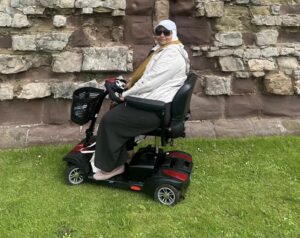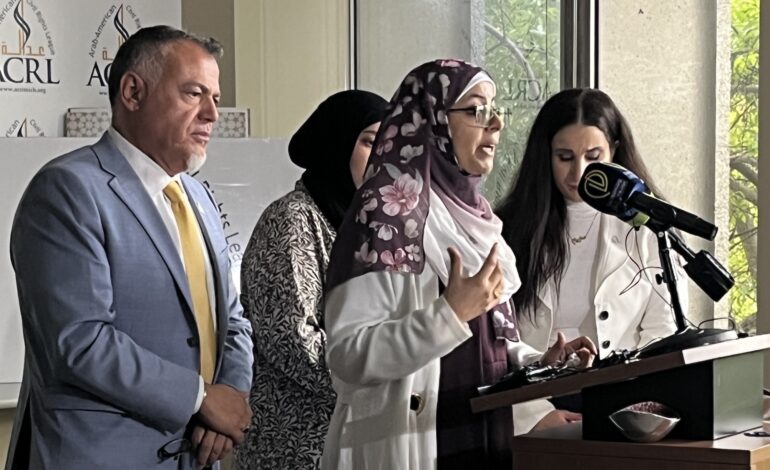The Arab American Civil Rights League filed a federal complaint against Customs and Border Protection after an officer questioned Taiba Elgattani, who wears a hijab and uses a wheelchair, for three hours in the Metro Detroit Airport before sending her back to where she lives in the U.K. without alerting her family.
Elgattani flew from the U.K. to Detroit with her sister Zenib Ali, who is a U.S. resident, Ali said in a press conference held in Dearborn Wednesday by the ACRL.
“What the officer did to my sister was unbelievable,” Ali said. “He saw her in the wheelchair. He asked her questions. She responded, but that wasn’t good enough. He just kept asking her over and over the same question, ‘why are you here?’ ‘I’m here to be with my family….’ How is that not a good enough answer?”
Elgattani, 53, is paralyzed from the waist down, Ali said. Ali initially went with Elgattani into the questioning room as a caretaker, but was escorted out once the CBP officer found out Elgattani spoke English.
“(I told the CBP officer) she (Elgattani) has health issues, I need to be with her. But it just didn’t matter to him. He said, ‘We will take care of her. Once we’re done, we’ll walk her out.’ That was it. I didn’t see her. I was waiting outside that security room for probably 40 minutes until they came to claim her luggage.”
Ali said she asked the officer who came to grab her luggage about why she was being kept. The officer told Ali her sister refused to speak.
“That doesn’t make sense,” Ali said. “Why would she not answer? Unless she’s sick or she has anxiety. I didn’t even know what the questions were, but then when we found out from her (later), the questions were like, ‘why are you here?’”

A photo of Taiba Elgattani provided by her family.
Ali said she visited Elgattani for the summer and brought her back to surprise the family and meet Ali’s grandchildren for the first time.
Ali’s daughter Amal Ali said she “jumped with joy” when her mother mentioned she brought Elgattani home to visit until November. Amal said it was unfortunate she didn’t get to see Elgattani while they were in the same country for the first time in years.
“Knowing that she had traveled so far to be here meant so much more than I could even explain,” Amal said. “Our family had been discussing plans to visit with her for a while, but we hadn’t found the means to do so yet. We had all hoped that she would come back with my mom, but we weren’t convinced that it would have been possible because of her health conditions.”
Amal said her family checked on Elgattani’s passport and documents with the British Consulate while waiting for her in international arrivals.
“Logistically, all the ducks were in a line,” she said. “The British Consulate, during the period we were waiting for her… checked her documents. They said everything was fine.”
Elgattani traveled under the U.S. Visa Waiver Program, but was stripped of program eligibility after not being allowed into the U.S. on Aug. 16, ACRL Executive Director Mariam Charara said.
“This is more than a single incident,” Charara said. “This is part of a larger troubling pattern of selective enforcement and discrimination that we (ACRL) must confront head on as an organization dedicated to protecting the civil rights of all individuals.”
Amal expressed the family’s frustration toward the failed reunion and the CBP treatment of her aunt. She said her family demands CBP “reevaluate its practices and trainings and honor their pledge to treat everyone with dignity and respect, regardless of where they come from.”
“Instead of a warm welcome, my aunt was met with intimidation and mistreatment by the U.S. CBP,” she said. “We firmly believe that her experience was fueled by racial bias. My aunt is visibly Muslim and of Arab descent, to the point where the initial officer assumed that she doesn’t speak English. We can’t help but feel that this played a significant role in how she was treated. Discrimination towards Arabs is far too prevalent, but has no place in our society, and is particularly concerning what affects vulnerable individuals like my aunt.”
In response to request for comment about the incident, CBP spokesperson Youssef Fawaz said CBP’s job is to protect U.S. borders and enforce laws at country entries.
“All international travelers arriving in the United States, including all U.S. citizens, are subject to inspection and examination,” Fawaz said.
CBP’s Anti-Discrimination and Anti-Harassment Policy Statement said the policy “prohibits harassment by or of any employee, supervisor, manager, contractor, vendor, applicant or other individual with whom CBP employees come into contact” and CBP “will not tolerate other forms of harassment, disruptive behavior or bullying in the workplace.”
ACRL founder Nabih Ayad, an attorney, said he’s spent more than a decade advocating for accountability and increased data collection on what kinds of people are typically stopped by CBP.
“Law enforcement do it (reporting) every day. When they use force, they have to document it,” Ayad said. “Why is it when you send somebody back after literally a two-day flight and treat them like garbage that you don’t have to document it? They (CBP) don’t want to do that because they want absolute discretion.”
Ayad said he wants to see the CBP officer fired for his treatment of Elgattani.
“This is not just about one woman’s experience,” he said. “This is about the rights of every person who seeks to visit this country, who seeks to reunite with their family and who seeks to do so without fear of intimidation, discrimination or unjust treatment because of the way they look or the color of their skin.”






Leave a Reply